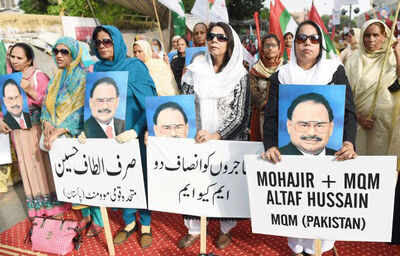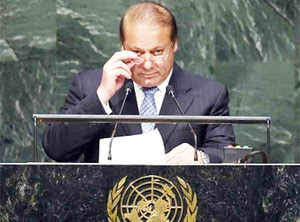”Shocking…completely shocking. I have no words for this,” exclaimed Marvi Memon, a ruling party lawmaker in Pakistan after watching clips of the protests outside UN. ”Azadi has been attained in 1947. If they have issues they should negotiate with the Government of Pakistan…the blood of every Pakistani will be boiling at this.”
Videos of the demonstrations show hundreds of protesters chanting ”Azadi” (freedom), which is the rallying cry for some separatist Kashmiris in J&K. The US wing of the Pakistan’s mainstream Mohajir Quami Movement, which organized the demonstrations, openly acknowledged its role and the rallying cry in a statement, saying, ”While Prime Minister Nawaz Sharif was addressing the United Nation General Assembly, raising the Kashmir issues and atrocities of Indian state in Kashmir, MQM USA chapter was protesting against state terrorism on 50 million Mohajirs in Pakistan.”
”Fifty million Mohajirs and their representative political party are being labeled as Indian and RAW agents in Pakistan by country’s ruling elite. Pakistan’s judicial system has failed to provide any justice or relief to Muhajirs and that’s why we had no option but to raise our voice against injustice in front of United Nations,” said Mohammed Arshad Hussain, described as the joint organizer of the protest.
Expectedly, the Pakistani establishment think the protest was masterminded by Indians, who in turn accuse the Pakistanis of funding separatist Khalistanis and Kashmiris, who held much smaller demonstrations. At least in the case of Kashmiris separatists, US law enforcement has established a money trail of Pakistani government funding.
Meanwhile, Mohajirs in UK and US have grown increasingly restive over the past few months in the face of the crackdown on the MQM in its Karachi stronghold by the Pakistani Rangers, a para-military force seen as part of the Punjabi establishment.
Separately, Baloch dissidents have also stepped up their activity outside Pakistan, lobbying for a separate state in Washington, London, and even New Delhi, where the Indian establishment has dropped any pretense of indifference and allowed its political representatives to hold meetings. Baloch exiles have also begun to call attention to the plight of their countrymen on the Hill, where some lawmakers, notably California’s Dana Rohrabacher, have called on Pakistan to recognise the Baloch right to self-determination.
With a section of the Mohajirs too heading down the track to ”azadi,” and New Delhi turning the spotlight on Pakistani human rights violations and tenuous hold on Balochistan and Pakistan-occupied Kashmir, Islamabad is finding that its support for Kashmir separatism in India has its own blow back.
 MQM activists protest in Karachi holding images of their leader Altaf Hussain. Pakistani police have registered
MQM activists protest in Karachi holding images of their leader Altaf Hussain. Pakistani police have registered
The background to the explosive call for international – and Indian intervention is Pakistani military’s ongoing crackdown in Karachi against workers of the MQM, which professes to represent Mohajirs, as Muslims who migrated from India during partition are called.
The crackdown is the outcome of what is essentially a political turf battle that pits the Urdu-speaking Mohajirs, who are heavily settled in Karachi and dominate its politics, against the Punjabi-majority military and its political acolytes in the north of the country, for control over Pakistan’s biggest revenue-generating city.
Altaf Hussain fled Pakistan for Britain in 1992 fearing threats to his life and has since then controlled MQM from London. Amid growing lawlessness, mayhem, and turf battles between Mohajirs, Baloch, and Pashtuns in Karachi, with the Punjabi-dominated center trying to exert its own control, he has rallied his supporters to demand more devolution, sometimes pressing for a new province for Mohajirs, in moves seen by the establishment as bordering on secessionism.
On Saturday, he went down the route again, telling his U.S supporters in a trademark telephonic address to internationalize the atrocities against Mohajir youth, who he said are being rounded up and exterminated in large numbers in Karachi. His speech also included an oblique, but explosive invitation to India to intervene to save the Mohajirs, who he said were sons of India.
”India is a cowardly country. Had it had so much as a smidgen of honor it wouldn’t have allowed Mohajirs to be slaughtered in Pakistan,” he told the gathering. The speech also mocked the Pakistani Army for its humiliating loss to India in the 1971war that led to the creation of Bangladesh.
The remarks touched a raw nerve in Islamabad where the military and its stooges have already sought to cast Hussain and his loyalists as traitors, in the same way the Punjabi elite portrayed Bengali leader Sheikh Mujibur Rehman before driving him to demand a separate state.
”The hate-inciting speech, made in a foreign country last night, crossed all limits. Heads of key institutions were insulted,” railed Interior Minister Nisar Ali Chaudhury, according to a report in the Dawn newspaper. ”Sarcastic poems were read against the armed forces of Pakistan and accusations were leveled against the army.”
”The speech made from MQM’s London Office is a conspiracy against the sovereignty and integrity of the country, as it invited foreign forces and India to interfere in Pakistan’s internal matters,” the minister said, adding that Hussain was attempting to abet waging of war against Pakistan and its institutions.
Pakistan has tried pin the blame for its increasingly fractious domestic politics on New Delhi, saying India is fomenting the unrest by backing separatist Mohajirs and Baloch. It even suckered the BBC into reporting that MQM workers in U.K had confessed to getting arms and training from India to make its case for alleged Indian interference in its internal affairs.
Nawaz Sharif rakes up Kashmir issue again, seeks expanded UN monitoring of Indo-Pak ceasefire
Instead, it was a familiar lament about how Kashmir has been neglected by the UN and resolutions on the issue had not been taken up, although Pakistan stands in violation of most aspects of the resolution such as vacating Occupied Kashmir.
“Global threat of terrorism cannot be defeated without addressing the underlying causes,” Sharif said, repeating an argument that has been largely discredited as validating terrorism. Without naming India, he said some countries were suppressing the rights of self-determination in the name of fighting terrorism.
Sharif said he had reached out to the Indian leadership when the new dispensation took over in New Delhi last year but things had gone south with the escalation in border tension in recent days.
To avert further escalation, he was proposing a new peace with India with steps, including formalising and respecting the 2003 understanding on ceasefire with a ramped up UMBOBIP, an affirmation that neither side will resort to force or threat of use of force, steps to demilitarize Kashmir, and mutual withdrawal from Siachen.
Pakistans Prime Minister did not address or refer to his country’s hosting of U.N and U.S designated terrorists and terror groups on its soil that by Pakistani accounts have government patronage. Yet he boasted of substantial progress in cleansing the country of all terrorists.
Sharif also put forth Pakistan’s view that any expansion of the UN Security Council should reflect the interests of all member states, and not be an expanded club of the powerful and privileged.
Pakistan’s claims of Indian aggression on the border or interference inside Pakistan have lacked credibility and have no takers in the international diplomatic circuit. When U.S Secretary of State John Kerry called on Sharif before his address, the “Prime Minister shared his views on relations with India and expressed deep concern over the Indian ceasefire violations on the LoC and the working boundary. The Prime Minister reaffirmed Pakistan’s commitment to peaceful resolution of all outstanding issues through dialogue,” a statement by the Pakistan Embassy said.
The same statement made no mention of any response to this complaint from Kerry. “Secretary Kerry appreciated Pakistan’s counter terrorism efforts and the success of Operation Zarb-e-Azb. He also expressed condolences over the terrorist attack on Badaber. Peace and reconciliation efforts in Afghanistan, as well as the security situation, were also discussed,” it said.
India’s External Affairs Minister Sushma Swaraj is expected to respond to Pakistan on October 2. Earlier, Afghanistan CEO Abdullah Abdullah stopped just short of accusing Pakistan of being a terrorist state, calling on Islamabad to crack down on terrorists on its territory.
“We call on Pakistan to do what its leadership promised to us a few months ago when they agreed to crack down on known terror outfits,” he said







